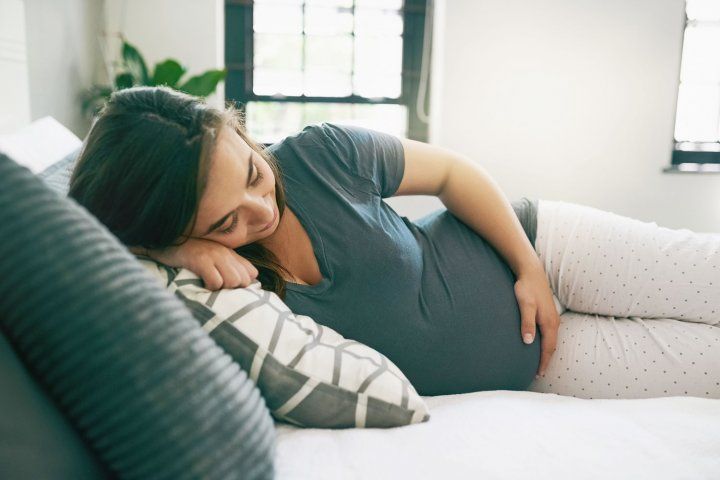
Symptoms for pregnant women with COVID-19 can be prolonged, lasting two months or longer for a quarter of the women who participated in a national study led by UC San Francisco and UCLA.
In the largest study to date of COVID-19 among non-hospitalized pregnant women, researchers analyzed the clinical course and outcomes of 594 women who tested positive for the SARS-CoV-2 virus during pregnancy.
They found that the most common early symptoms for pregnant women were cough, sore throat, body aches, and fever. Half of the participants still had symptoms after three weeks and 25 percent had symptoms after eight weeks. Findings appear Oct. 7 in Obstetrics & Gynecology.
“We found that pregnant people with COVID-19 can expect a prolonged time with symptoms,” said senior author Vanessa L. Jacoby, MD, MAS, vice chair of research in the Department of Obstetrics, Gynecology, and Reproductive Sciences at UCSF, and co-principal investigator of the national pregnancy study. “COVID-19 symptoms during pregnancy can last a long time, and have a significant impact on health and well-being.”
The PRIORITY study (Pregnancy Coronavirus Outcomes Registry) is an ongoing study in the United States for women who are pregnant or up to six weeks after pregnancy and have a confirmed or suspected case of COVID-19. It launched March 22, 2020.
While previous research on SARS-CoV-2 infection in pregnancy has primarily centered on hospitalized patients, the new analysis focused on ambulatory patients, who represent the overwhelming majority of adults with the virus.
Study participants tested positive between March 22 and July 10, and had a mean age of 31 years. Health care workers made up nearly a third of the cases, and participants were geographically diverse: 34 percent lived in the Northeast, 25 percent in the West, 21 percent in the South, and 18 percent in the Midwest.
Thirty-one percent of the participants were Latina, and 9 percent were Black. The average gestational age at the time of enrollment in the study was approximately 24 weeks.
The researchers found several common symptoms of COVID-19, but also that symptoms related to the virus were complicated by overlapping symptoms of normal pregnancy, including nausea, fatigue and congestion. Their findings included the following:
- Primary first symptoms were cough (20 percent), sore throat (16 percent), body aches (12 percent), and fever (12 percent); by comparison, fever occurs in 43 percent of non-pregnant hospitalized patients;
- Loss of taste or smell was the first symptom in 6 percent of pregnant women;
- Other symptoms included shortness of breath, runny nose, sneezing, nausea, sore throat, vomiting diarrhea, or dizziness;
- 60 percent of women had no symptoms after four weeks of illness, but for 25 percent, symptoms persisted, lasting eight or more weeks;
- The median time for symptoms to resolve was 37 days;
- Medical conditions for some participants included hypertension, pregestational diabetes, asthma, cardiac disease, thyroid disease, anxiety and depression.
The authors said that data on the clinical evolution of the virus are critical in order to assess risk and guide treatment during pregnancy.
“The majority of participants in our study population had mild disease and were not hospitalized,” said first author Yalda Afshar, MD, PhD, assistant professor in the Division of Maternal Fetal Medicine, Department of Obstetrics and Gynecology, at the David Geffen School of Medicine at UCLA. “Even so, it took a median of 37 days for symptoms to ease.”
“Despite the potential risks of COVID-19 for pregnant people and their newborns, there are large gaps in our knowledge on the course of the disease and the overall prognosis,” she said. “Our results can help pregnant people and their clinicians better understand what to expect with COVID-19 infection.”
Co-authors: UCSF co-authors are Stephanie L. Gaw, MD, PhD; Valerie J. Flaherman, MD; Brittany D. Chambers, PhD, MPH; and W. John Boscardin, PhD. From UCLA, co-authors are Deborah Krakow, MD, and Grace Aldrovandi, MD. A full list of authors and affiliations can be found in the study.
Funding: The study was supported by the California Health Care Foundation; Centers for Disease Control and Prevention Foundation; Bill and Melinda Gates Foundation; UCSF National Center of Excellence in Women’s Health; CTSI grant #UL1 TR000004; and individuals who provided support through the registry’s crowdfunding sites.
Conflicts: One author from Weill-Cornell Medical College is a vaccine consultant for GlaxoSmithKline. The remaining authors reported no potential conflicts of interest.
UCSF Health is recognized worldwide for its innovative patient care, reflecting the latest medical knowledge, advanced technologies and pioneering research. It includes the flagship UCSF Medical Center, which is ranked among the top 10 hospitals nationwide, as well as UCSF Benioff Children’s Hospitals, with campuses in San Francisco and Oakland, Langley Porter Psychiatric Hospital and Clinics, UCSF Benioff Children’s Physicians and the UCSF Faculty Practice. These hospitals serve as the academic medical center of the University of California, San Francisco, which is world-renowned for its graduate-level health sciences education and biomedical research. UCSF Health has affiliations with hospitals and health organizations throughout the Bay Area.
"many" - Google News
October 07, 2020 at 08:03AM
https://ift.tt/36NNTQR
COVID-19 Has a Prolonged Effect for Many During Pregnancy - UCSF News Services
"many" - Google News
https://ift.tt/2OYUfnl
https://ift.tt/3f9EULr
No comments:
Post a Comment